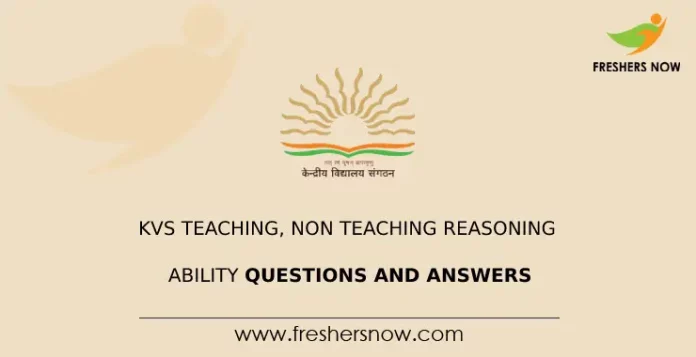
KVS Teaching, Non Teaching Reasoning Ability Questions and Answers: Check out this article if you are searching for the Important Reasoning Questions for KVS PGT/ TGT, Primary Teacher and other posts. Here we have accommodated the KVS Teaching, Non Teaching Reasoning Ability Quiz for you to practice for the exam which will be conducted shortly. Go through the KVS Teaching, Non Teaching Reasoning Ability Questions and know what topics you need to prepare for the exam.
Important Reasoning Questions for KVS PGT/ TGT
By going through the Reasoning Ability Questions for KVS Exam from the below section, you can find the questions from topics like Non-verbal series, Arithmetical Reasoning, Visual Memory, Verbal Classification, Figures Classification, etc.
1. Select a figure from amongst the Answer Figures which will continue the same series as established by the five Problem Figures.
Problem Figures: Answer Figures:

A. 1
B. 2
C. 3
D. 4
E. 5
Answer: Option C
Explanation:
In each step, element at the upper-right position gets enlarged, inverts vertically and reaches the lower-left corner; the existing element at the lower-left position, is lost and a new small element appears at the upper-right position.
2. Select a figure from amongst the Answer Figures which will continue the same series as established by the five Problem Figures.
Problem Figures: Answer Figures:

A. 1
B. 2
C. 3
D. 4
E. 5
Answer: Option B
Explanation:
In each step, the elements move in the sequence.
3. Select a figure from amongst the Answer Figures which will continue the same series as established by the five Problem Figures.
Problem Figures: Answer Figures:

A. 1
B. 2
C. 3
D. 4
E. 5
Answer: Option A
Explanation:
Both the larger and the smaller squares move to the adjacent corner ACW in each turn. Also, the shading in the smaller square moves 1, 2, 3, 4, 5, … steps ACW sequentially and the shading in the larger square moves 1, 2, 3, 4, 5,…. steps CW sequentially.
4. Select a figure from amongst the Answer Figures which will continue the same series as established by the five Problem Figures.
Problem Figures: Answer Figures:

A. 1
B. 2
C. 3
D. 4
E. 5
Answer: Option A
Explanation:
One, two, three, one, two, three…..arcs get inverted sequentially. This inversion takes place in an ACW direction.
5. Two bus tickets from city A to B and three tickets from city A to C cost Rs. 77 but three tickets from city A to B and two tickets from city A to C cost Rs. 73. What are the fares for cities B and C from A ?
A. Rs. 4, Rs. 23
B. Rs. 13, Rs. 17
C. Rs. 15, Rs. 14
D. Rs. 17, Rs. 13
Answer: Option B
Explanation:
Let Rs. x be the fare of city B from city A and Rs. y be the fare of city C from city A.
Then, 2x + 3y = 77 …(i) and
3x + 2y = 73 …(ii)
Multiplying (i) by 3 and (ii) by 2 and subtracting, we get: 5y = 85 or y = 17.
Putting y = 17 in (i), we get: x = 13.
6. A, B, C, D and E play a game of cards. A says to B, “If you give me three cards, you will have as many as E has and if I give you three cards, you will have as many as D has.” A and B together have 10 cards more than what D and E together have. If B has two cards more than what C has and the total number of cards be 133, how many cards does B have ?
A. 22
B. 23
C. 25
D. 35
Answer: Option C
Explanation:
Clearly, we have :
B-3 = E …(i)
B + 3 = D …(ii)
A+B = D + E+10 …(iii)
B = C + 2 …(iv)
A+B + C + D + E= 133 …(v)
From (i) and (ii), we have : 2 B = D + E …(vi)
From (iii) and (vi), we have : A = B + 10 …(vii)
Using (iv), (vi) and (vii) in (v), we get:
(B + 10) + B + (B – 2) + 2B = 133 5B = 125 B = 25.
7. A woman says, “If you reverse my own age, the figures represent my husband’s age. He is, of course, senior to me and the difference between our ages is one-eleventh of their sum.” The woman’s age is
A. 23 years
B. 34 years
C. 45 years
D. None of these
Answer: Option C
Explanation:
Let x and y be the ten’s and unit’s digits respectively of the numeral denoting the woman’s age.
Then, woman’s age = (10X + y) years; husband’s age = (10y + x) years.
Therefore (10y + x)- (10X + y) = (1/11) (10y + x + 10x + y)
(9y-9x) = (1/11)(11y + 11x) = (x + y) 10x = 8y x = (4/5)y
Clearly, y should be a single-digit multiple of 5, which is 5.
So, x = 4, y = 5.
Hence, woman’s age = 10x + y = 45 years.
8. A girl counted in the following way on the fingers of her left hand : She started by calling the thumb 1, the index finger 2, middle finger 3, ring finger 4, little finger 5 and then reversed direction calling the ring finger 6, middle finger 7 and so on. She counted upto 1994. She ended counting on which finger ?
A. Thumb
B. Index finger
C. Middle finger
D. Ring finger
Answer: Option B
Explanation:
Clearly, while counting, the numbers associated to the thumb will be : 1, 9,17, 25,…..
i.e. numbers of the form (8n + 1).
Since 1994 = 249 x 8 + 2, so 1993 shall correspond to the thumb and 1994 to the index finger.
Direction (9 to 11): In each of the following questions, five words have been given out of which four are alike in some manner, while the fifth one is different. Choose the word which is different from the rest.
9. Choose the word which is different from the rest.
A. Chicken
B. Snake
C. Swan
D. Crocodile
Answer: Option A
Explanation:
All except Chicken can live in water.
10. Choose the word which is different from the rest.
A. Kiwi
B. Eagle
C. Emu
D. Ostrich
Answer: Option B
Explanation:
All except Eagle are flightless birds.
11. Choose the word which is different from the rest.
A. Rigveda
B. Yajurveda
C. Atharvaveda
D. Ayurveda
Answer: Option D
Explanation:
All except Ayurveda are names of holy scriptures, the four Vedas. Ayurveda is a branch of medicine.
12. In the below question one main figure is embedded in any of the four option figures. Find the option which contains main figure.
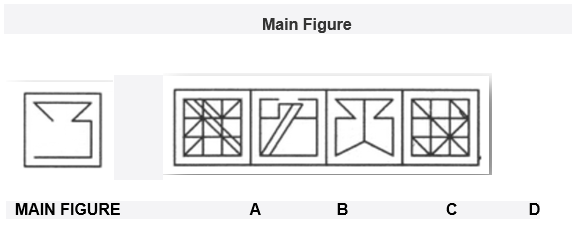
A. A
B. B
C. C
D. D
Ans – A
13. In the below question one main figure is embedded in any of the four option figures. Find the option which contains main figure.
Main Figure

A. A
B. B
C. C
D. D
Ans – D
14. In the below question one main figure is embedded in any of the four option figures. Find the option which contains main figure.
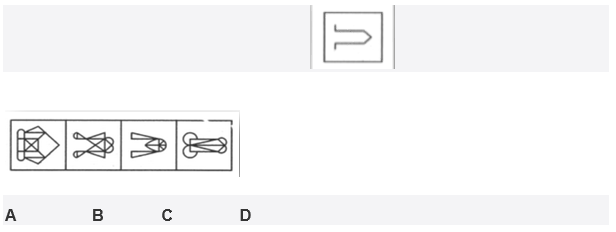
A. A
B. B
C. C
D. D
Ans – B
15. In the below question one main figure is embedded in any of the four option figures. Find the option which contains main figure.
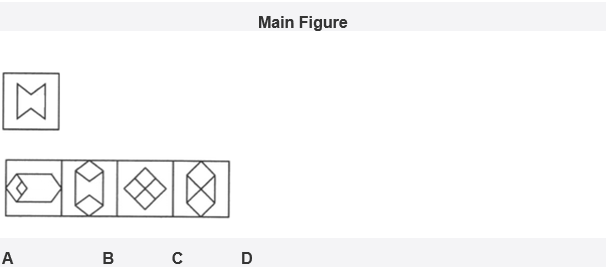
A. A
B. B
C. C
D. D
Ans – B
16. In the below question one main figure is embedded in any of the four option figures. Find the option which contains main figure.
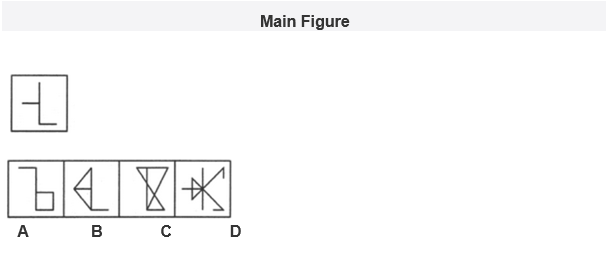
A. A
B. B
C. C
D. D
Ans – B
17. Choose the ODD figure out:

A. 1
B. 2
C. 3
D. 4
Answer: option d
Explanation:
The rectangle rotates anticlockwise and the arrows change directions. The direction of arrows in image (4) is not changed.
18. Choose the ODD figure out:

A. 1
B. 2
C. 3
D. 4
Answer: option c
Explanation:
The small dark and white squares move anticlockwise. Their positions are incorrect in figure (3).
19. Choose the ODD figure out:

A. 1
B. 2
C. 3
D. 4
Answer: option d
Explanation:
The smaller extensions at the end of the lines are increasing i.e. 1 in first image, 2 in second and so on. Image 4 is incorrect because it has 6 extensions.
20. Choose the ODD figure out:

A. 1
B. 2
C. 3
D. 4
Answer: option c
Explanation:
From figure (1), the arrow caps of the left top and right bottom reverses and the remaining arrows altogether change direction to form figure (2). From figure (2), the arrow caps of the right top and left bottom reverses and the remaining arrows altogether change direction to form figure 3. From figure (3), the arrow caps of the top and bottom center reverses and the remaining arrows altogether change direction to form figure (4). Then step I repeats.
In figure (3), the arrow caps of top left and bottom right are incorrect.
★★ You Can Also Check ★★



